After World War II, communes and cooperative communities became internationally oriented in their membership and networking began to develop. Unlike earlier such enterprises, these groups shared an openness to international relationships. This was evident both in the groups” social composition, and in the extension of networks beyond their own country. Such globalization opened up the possibility of comparative analysis, which has become a trend in research since the 1950s. The dynamism and speed with which voluntary communities have spread throughout the world is impressive. In the 1950s there were only a few hundred such societies, but by the end of the last century there were thousands. These have taken a variety of forms. There are religious and secular communes, intentional communities, ecological communities, co-housing projects, various types of Christian communities, communities of Eastern religions, and spiritual communities inspired by New Age thought. Yaacov Oved shows that such societies maintain a community based on cooperation and expand their influence through newspapers, television, and the Internet. Their chief characteristic is their openness to the outside world, and their search for a way to move beyond a world of individualism and competitiveness. To accomplish this, they embrace all the tools of the modern world. Oved observes that those who predicted the failure of communes and intentional communities failed to appreciate the extent to which people in today”s society aspire to communal life. This book answers the doubters and does so with a sense of deep historical understanding.
Yaacov Oved
Globalization of Communes [PDF ebook]
1950-2010
Globalization of Communes [PDF ebook]
1950-2010
Mua cuốn sách điện tử này và nhận thêm 1 cuốn MIỄN PHÍ!
định dạng PDF ● Trang 326 ● ISBN 9781351517270 ● Nhà xuất bản Taylor and Francis ● Được phát hành 2017 ● Có thể tải xuống 3 lần ● Tiền tệ EUR ● TÔI 5323898 ● Sao chép bảo vệ Adobe DRM
Yêu cầu trình đọc ebook có khả năng DRM












